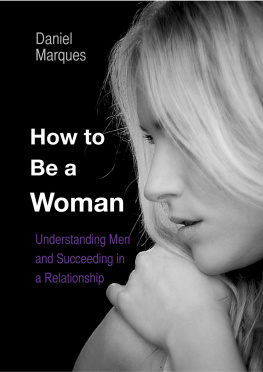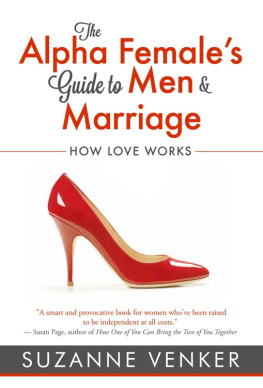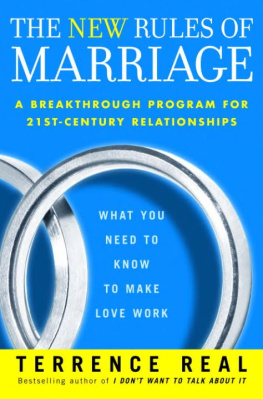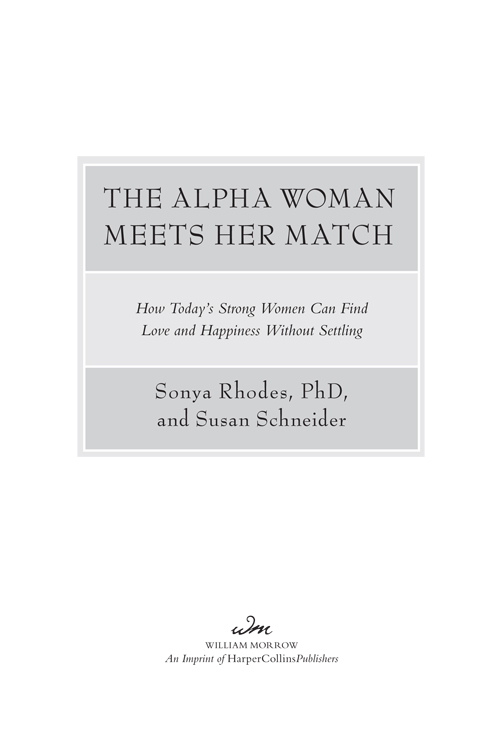To Bob
S.R.
To my daughter, India
S.S.
Contents
I n the years Ive spent building a thriving private practice as an individual and couples therapist, Ive ridden the waves of the womens movement and the sexual revolution. But one day, as a client in her early thirties sat back with a sigh and said, I guess Im just your typical strong, overachieving woman with boy problems, I realized that I was seeing something distinctly new. Over the last decade or so, my practice has been crowded with women just like her: self-confident, accomplished, sexualbut unhappy and frustrated by their lack of success in relationships. These are the new Alpha women.
Theres never been a better time to be an Alpha woman. Shes on the rise in her education and in the professions. Shes self-reliant, and she can explore her sexuality and make her own life choices. But many fear that marriage or a long-term relationship will somehow elude them.
In our society loud voices complain about women being too strong and too threatening and too sexual. The takeaway message? That women will overwhelm men with their strength and sexuality, and that no one will want to marry them. Lets lay that fear to rest: until the 1970s, well-educated, high-earning women were less likely to marry than less-educated women. But over the last four decades, marriage rates have either held constant or increased for the top 10 percent of female earners, according to a report from the Hamilton Project. Another study, cited by Stephanie Coontz in the New York Times , finds higher marriage rates for the top 15 percent of female earners. According to the Council on Contemporary Families: College-educated women have a much greater likelihood of marrying at an older age than women of any other educational level.... College-educated women are more likely than any other group of women to report themselves happy in their marriage, whatever the level of their family income, and they are much less likely to think that financial security is the main benefit of marriage.
Until recently, women who married later than average had higher rates of divorce. Today, with every year a woman delays marriage, up to her early thirties, her chance of divorce decreases, and it does not rise again thereafter, reports Stephanie Coontz in the New York Times . For many of you reading this book, all of this is good news ( if your plans include marriage!).
The dire predictions for women are way overinflated, and those who sound the alarms have their own agenda. Sometimes women themselves join the chorus of alarmists. A strong undercurrent of worry surfaces when they hear about a friend or colleagues divorce. One recently divorced woman told me that she could always count on these two questions: Had she worked too much? Was she a higher earner than her husband? These are womens secret fears. If a marriage breaks up, it has to be the womans fault, right? And even our supposed allies may surprise us: that same woman who was interrogated by her friends was asked by a major womens magazine to write an essay about how her career ruined her marriage!
One woman in a focus group said, I feel like an evolved person. I have a great career and great friends. I feel really strong in every part of my life except in relationships. Ive heard many Alpha women express the fear that they wont find someone to love and to marry. Maybe they are too threatening to men, they say. Perhaps they should tone themselves down, they fret. I say, absolutely not. That is a big mistake.
Whenever I hear women say these things, I get angrynot at the women, of course, but at a culture that thrives on making dire predictions about the failed loves and lives of assertive, sexual Alpha women. Its simply ridiculous. For you, finding a mate is challenging, but the pool is large and your energy is strong.
What todays Alphas can do is be more careful about their choices. As it is, the women I treat are confident and overwhelmed, successful and self-doubting, sassy and diffident. Theyve been bruised by their experiences with men. The woman in the focus group added that she felt emotionally beaten up when a man she was seeing lost interest just as their relationship was on the verge of deepening. I felt strong and good, she says. I was ready to take the plunge. But after that I felt I couldnt trust my judgment anymore.
With egos shaken by unsuccessful relationships, women often feel uncharacteristically vulnerable and undone. When they walk into my office, they are seeking a mentor to guide them through the winding maze of dating, so that they can avoid the dead ends and arrive at the goal of finding someone with whom they can share their life. And I never encourage women to settle, tone themselves down, or blame themselves exclusively for problems in a relationship. None of these is an option. Never!
Images of those women paraded across my mind and their stories begged to be written about. Their dilemma is a telling part of todays zeitgeist. The Alpha Woman Meets Her Match is a boots-on-the-ground book that conveys everything I teach my patients and also includes the thoughts that I normally choose to keep to myself. The book is sourced from my clients histories, focus groups, in-depth interviews, and from my deep layers of experience. You, the reader, will view clinical vignettes taken from my practice (composites of clients disguised to protect their identity). Every case study has a conclusion that you can apply to your own life. The stories will resonate with your experiences and offer plenty of insights and solutions for making the right choices in your personal lifewithout having to settle or compromise the person you are or wish to become.
TAKE BACK YOUR ALPHA
Ballbuster. Bitch. Bossy . Negativity swirls around assertive women. I know that the word Alpha paired with woman comes with a lot of baggage. At first I was advised to find a less controversial term than Alpha woman . But I decided to stick with it precisely because it has negative connotations. I do not think we should dumb down womens power and status by avoiding the Alpha in her. I think we should call it like it is. Were not doing a service, either to women or men, if we search for terms that dont ruffle feathers. The fact is there is a new gender-role reality, and it is retro to parse terms or, God forbid, threaten mens egos. I will never advise women to bend over backward to boost mens self-images by playing down their strengths. Those days are over.
Some fascinating research points to an urgent need for social norms to keep up with changing times. One study from the University of Chicago Booth School of Business found that when a woman earns the same or more than her mate, marital troubles often ensue. The wife may decide to work less or even go for a lower-paying joba prime example of what it means to tone yourself down!in order to protect the traditional belief that a man must be the family breadwinner. Even more amazing, the wife will often take on more of the household chores as a way to compensate for her greater earning power, with the aim of being nonthreatening to her husband. The academic term for this is gender deviation neutralization . Translation into English: if you dare to deviate from the norm (husband equals breadwinner), then you must somehow, in someway compensate for your abnormal behavior! This is a no-win situation; women should never tailor their behavior to meet social stereotypes. Ultimately, youll hurt yourself and your relationship.
Over the last several decades, weve seen advances, like better birth-control options, exciting growth in economic opportunities for women, and the evolution of the feminist movement, as well as strong female role models in politics, the media, business, and academia. More women than men graduate from college and graduate school. Increasing numbers of women are enrolled in medical school. In 147 out of 150 of the biggest cities in the United States, unmarried, childless women under thirty earn 8 percent to 15 percent more than their male peers. Women contribute 40 percent of family wages, though they still make eighty cents to the mans dollar. In 25 percent of couples, women make more money than their husbands. In middle- and working-class families, women have more opportunities for economic and social mobility than men do. As you can see, neither the myth of the male breadwinner nor of the traditional female stands up to reality. We see the proof all around us: if women are successful in the business world and men are successful at home, both of which are clearly true, then the old stereotypes are just empty shells.










